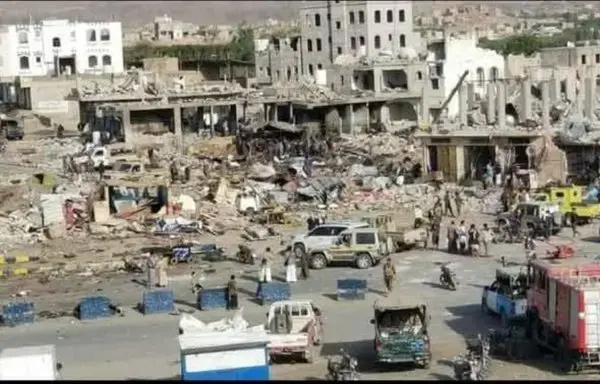Security
Houthi missile failures and attacks leave trail of civilian deaths in Yemen
The Iran-backed group's failed missile launches and targeting of civilian infrastructure have caused widespread destruction and loss of life.

By Faisal Abu Bakr |
ADEN -- A series of failed Houthi ballistic missile launches and deliberate attacks on civilian targets in Yemen have killed at least one person and wounded dozens more, sparking widespread local and international condemnation.
An explosion rocked the al-Hawban area east of Taez city July 5 as the Iran-backed group tried and failed to launch a ballistic missile targeting maritime navigation, causing panic among residents, according to Yemen Online.
Two days earlier, a Houthi drone caused a huge explosion at al-Qudsi fuel station in central Taez, killing one person and wounding 23, including six civil defense personnel, according to a Taez police statement posted by the Ejaz network.
The blast caused widespread destruction to homes and shops.
On May 30, a large explosion heard at a Houthi weapons depot in Mawiyah Junction sparked panic among residents, local media reported.
These incidents reflect what experts describe as a "pattern of systematic violations" involving failed missiles, direct shelling and explosions at weapons depots located within residential neighborhoods.
"This is not the first time that Houthi missiles have fallen on civilians," said Fahmi al-Zubairi, director general of the human rights office in Sanaa.
"The most recent incident occurred in eastern Taez, which represents a flagrant violation of international humanitarian law, specifically the principles of distinction [of civilian targets] and proportionality," he told Al-Fassel.
Al-Zubairi said these acts may amount to "war crimes" under the Rome Statute and called for an urgent international investigation and comprehensive documentation of the damage and casualties.
Serving the Iranian regime
The Houthis' threat to international navigation and commercial vessels also violates the United Nations Convention on the Law of the Sea and contravenes Security Council resolutions, including Resolution 2216, he said.
Al-Zubairi warned that the Houthis seek to impose themselves as a regional power following the collapse of the Iranian "axis of resistance" by serving the Iranian regime's agenda in the Red Sea.
Additionally, he said, the group is fueling internal strife and spreading chaos in areas of Yemen under its control by arming its loyalists.
Political analyst Faisal Ahmed described the indiscriminate shelling, explosions at weapons depots, and deliberate targeting of fuel stations and civilian infrastructure as "reckless and irresponsible acts" and "acts of terrorism."
These underscore the group's disregard for lives and property, he told Al-Fassel.
The use of residential areas as launch pads or storage sites endangers civilians and aims to cause economic damage and disrupt daily life, in addition to destabilizing the Red Sea and international navigation, Ahmed said.
May God unite us and protect all Yemenis
The Houthi group has spread corruption on earth.
Al Houthi could not unify. I am very sad.